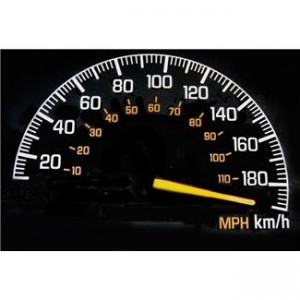Here at Debate Central, we’re huge fans of speaking clearly and persuasively. We understand, however, that the demands of many activities make that complicated. Many debaters struggle to balance the desire to speak fast enough to be competitive with the need to communicate in a way that most judges and competitors will easily understand. Case in point, we had a question come in over Twitter this weekend about how to do just that. We responded (briefly) but definitely have more to say on the matter. Why? Well, it’s a complicated skill to master. While a good amount of additional speed can be an asset, there are so many ways this same asset can go wrong and hurt your speaker points. Today we have some quick tips on how to pick up the pace without leaving your speaker points in the dust.
We responded (briefly) but definitely have more to say on the matter. Why? Well, it’s a complicated skill to master. While a good amount of additional speed can be an asset, there are so many ways this same asset can go wrong and hurt your speaker points. Today we have some quick tips on how to pick up the pace without leaving your speaker points in the dust.
1. Assess whether or not you actually need to be any faster. Many debaters attribute issues with coverage to “being slow” when actually other problems may contribute to their inability to answer everything in a timely manner. First, assess:
- How is your word economy? Oftentimes, debaters get bogged down by saying too many unnecessary words or using filler phrases like “at the point at which” or “so what you’re going to see is” — transitions that waste time without moving the debate forward. Record yourself to get a sense of how often you use unnecessary words and work on eliminating the phrases you’re over-using or are depending on to give you time to think. Look through your tags and blocks to see if you’re saying too much when you could be saying less. This alone is actually enough to solve most coverage issues – with no increase in spend necessary. In fact, many debaters find that, when they address word economy, they can actually slow down.
- Are you going faster than you really can? If you’re pushing your speed too much, too fast, you’ll tend to mumble or stumble through words or get ahead of where your eyes are reading. In these cases, you stop often without noticing it to find your place or correct mispronunciation. Go as fast as you comfortably can and no faster. You might be surprised how much better and faster you read without constant backtracking
- Do you need speed or practice? Many debaters like to talk fast. It can be a fun skill and really put pressure on your opponents to keep up. That said, your focus should be on researching and understanding the topic. If you’re losing debates because you don’t have evidence or can’t explain your arguments, you don’t need to get faster. You need to cut more cards. Remember, you will be naturally faster if you’re confident in what you’re saying and know what you want to say next. That comes from research. If you’re losing debates because you keep dropping arguments, however, you might need to pick up the pace.
2. Build speed slowly and naturally. When you speak in a debate, you should sound:
- Like yourself. Your voice shouldn’t go up or down — it should sound however you sound when you speak normally to your friends.
- Like a human being that breathes normally. Learn to take breaths at natural intervals, without gasping loudly or double-breathing.
Avoiding the above issues is critical to keeping your speaker points on the up and up. You want your judge to hear and understand you, not struggle to comprehend while avoiding your distracting habits. When you are trying to become faster, you should gently push your speed, little by little. As soon as one of the above issues happens, slow down. You will get faster over time by slowly pushing yourself to be a little quicker. Every day, speed up to just the edge of uncomfortable and maintain that pace. Over time, you’ll naturally become faster without losing your voice, giving yourself a sore throat, or inducing a coughing fit. As a bonus, you’ll be naturally clearer because debaters who speak that way are much easier to understand.
3. You don’t always have to be making noise. Many debaters can’t stand silence in their speeches so they tend to “hum” — that is, emit a low-pitched buzzing noise between cards/words/thoughts. If you get stuck, don’t push forward or “hum.” Just pause. A pause in a speech may feel like a million years but it’s usually shorter than that by a bunch. In fact, it’s usually a good way to give yourself a chance to swallow (reading fast is notorious for making people.. well, drool), re-set your pacing, and move forward. Putting pressure on yourself to “never stop” makes it more likely you’ll stutter, stumble, or get ahead of yourself. It’s also, frankly, not fooling anyone.
These three common-sense tips for talking faster (while maintaining clarity) are usually all the pacing tips anyone needs to be successful. Assess, Practice, and Pause and you’ll be reading 1AR cards and reading extra 2AC blocks in NO TIME.
Do you have tips for pacing? Questions? Let us know in the comments!


Pingback: The 12 Best Debate Tips We’ve Ever Heard « Free Debate Resources | Debate Central
Pingback: Judges’ Top Pet Peeves, and How to Avoid Them (Part 1/2) « Free Debate Resources | Debate Central